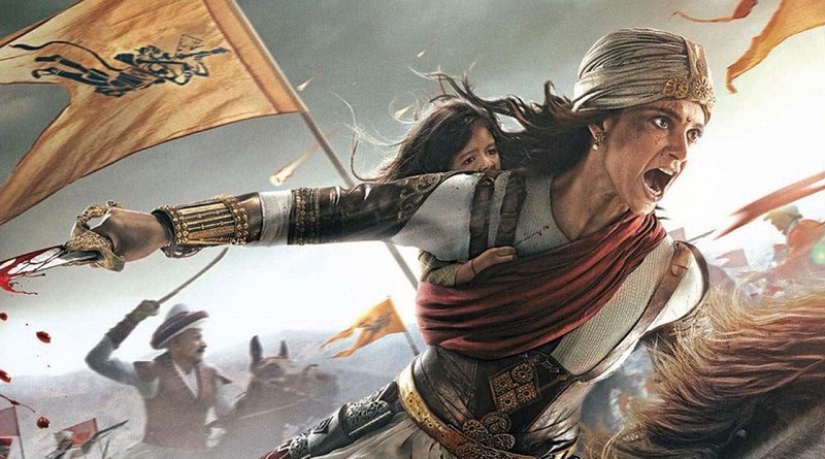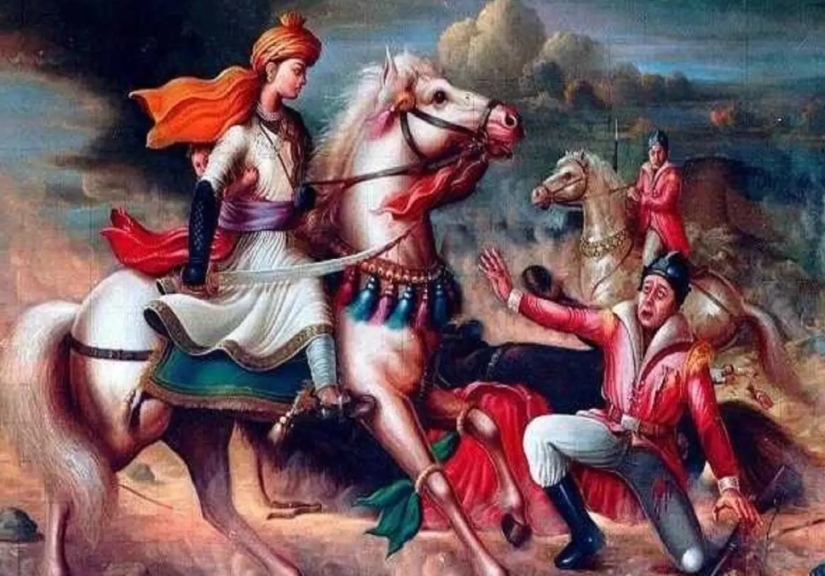The Story of Lakshmi Bai, an Indian Warrior Princess
History knows many cases when women commanded armies or even led uprisings. In North Africa, the fearless Dahia Al-Kahina became so famous, which terrified the Arab invaders in the 7th century. India has its own heroine - Princess Lakshmi Bai. This woman in the 19th century went down in history and became a national hero, becoming one of the key figures in the Indian uprising against Britain.

Lakshmi Bai was born in 1828 in the family of an adviser to the minister, who lived in the holy city of Varanasi. She was given the name Manikarnika, which means "mistress of jewels." The daughter of an important official was brought up at the court of the ruler. True, she did not find a girl's company, and Manikarnika was surrounded by boys - the sons of politicians and courtiers. Thanks to this, she mastered not at all feminine wisdom - fencing, wrestling and horseback riding.

At the age of 14, the girl's childhood ended. She was married to Gangadar Rao, the Maharaja of Jhansi, a small region in northwestern India. The ruler had already been married before and had recently been widowed. According to the laws of her country, Manikarnika took a new name in marriage - Lakshmi Bai.

The husband was 20 years older than Lakshmi. He showed no interest in his young wife, and the girl was left to her own devices. Some said that the Maharaja loved men, others that he kept a whole army of mistresses. He married simply because custom demanded it.

Gangadar Rao treated Lakshmi well - he was so kind that he allowed her an unheard-of freedom for a woman, especially a married one. The young wife could continue to improve in the martial arts as long as she wanted. Moreover, her husband allowed her to create a detachment of the female palace guard and train it.
After 11 years, the Maharajah died, leaving no heirs. As a woman, Lakshmi Bai could not take the place of the ruler, so before his death, Gangadar Rao adopted a boy to whom he planned to hand over the reins of power. The principality of Jhansi was relatively independent within British India, but after the death of the Maharaja, everything changed. The British seized power and refused to recognize the adopted heir as ruler.

A year after the death of the ruler, the princess and heir were ordered to leave the principality. She refused to do so and lived in uncertainty for another year. In 1857, a sepoy uprising broke out in India. Ordinary Indians killed and robbed the colonialists, as well as their compatriots loyal to the British. More and more territories turned out to be captured by the rebels, and Lakshmi asked the British to protect the principality of Jhansi from the rebels.

But they refused, and Lakshmi Bai decided to join the rebels. The first test for the princess and her supporters was the defense of the principality from the detachments of the British General Hugh Rose. The woman gathered an impressive army of 14 thousand of her subjects and 15 thousand sepoys who had previously served the East India Company. It was a real army with iron discipline. Lakshmi even managed to solve the problem of lack of weapons - in the Jhansi fort, under her leadership, cannons began to be cast.
In March 1858, the decisive battle took place. Alas, the army of Lakshmi Bai lost to the well-armed British. Her supporters were dispersed, and the princess herself with the heir of the Maharaja was forced to flee to a neighboring principality. But the brave woman did not give up. She again raised an army and in May of the same year entered into battle with the army of Rose. But the rebels were again defeated.

The princess and her supporters had to retreat to the fortress of Gwalior. It was a powerful fortification, on which the sepoys had high hopes. However, they did not materialize, and on June 16, 1858, General Rose captured the fortress. The next day, Lakshmi Bai, with the remnants of her army, entered into battle with the British outside the fortress walls. In this battle, a brave woman died. It is believed that with the death of Lakshmi Bai, the sepoy rebellion ended.

General Hugh Rose spoke respectfully of the warrior princess. He called her the most dangerous rebel leader, brave, persistent and quick-witted. Also, the English commander compared Lakshmi Bai with Joan of Arc. His compatriot, General Mason, in his book on the sepoy uprising, wrote that the princess took part in the uprising due to unfair treatment, fought bravely and died defending her land.
Recent articles

It's high time to admit that this whole hipster idea has gone too far. The concept has become so popular that even restaurants have ...

There is a perception that people only use 10% of their brain potential. But the heroes of our review, apparently, found a way to ...

New Year's is a time to surprise and delight loved ones not only with gifts but also with a unique presentation of the holiday ...